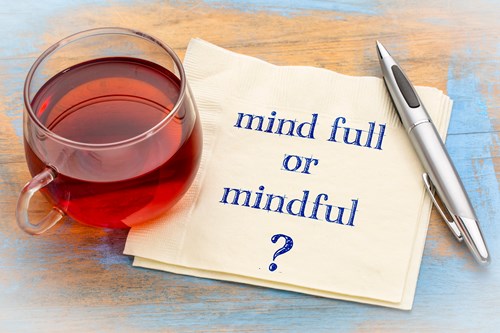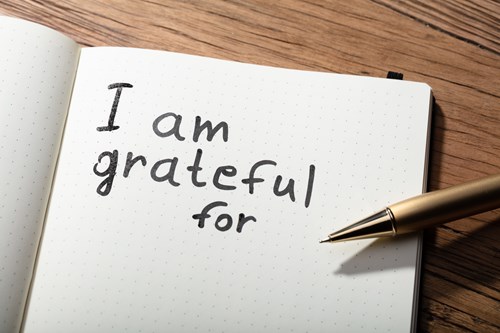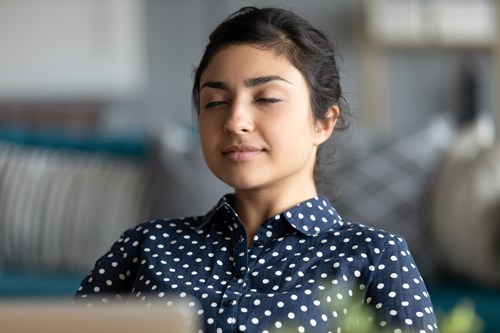Improving Wellbeing in Times of Stress
It's important in times of stress to look after our overall health and wellbeing.
It might be cliché to say this but the recent pandemic was a life-changing time in so many ways.
Everyone was impacted in some way by COVID-19. Nobody’s life was left unchanged.
Change creates stress and anxiety as well as the loss of control, and this makes it more challenging to manage our health and wellbeing effectively.
If you have diabetes, then taking steps to avoid getting infected with Coronavirus and other viruses, like staying at home and following social distancing measures, is important.
However, it’s also important to look after our overall health and wellbeing.
During the pandemic, I was involved in supporting the West London Wellbeing Course in Acton, where we discussed four actions (partly inspired by Rangan Chatterjee’s book, The 4 Pillar Plan) that can improve wellbeing: Relax, Eat, Move and Sleep. Each of these has a huge impact on our health and overall sense of wellbeing.
As well as doing some of the speaking, I learned a huge amount and made changes to how I look after the body that I’ve been given. We watched some videos, listened to some talks and had some great group discussions.
Here’s what I learned from the first session.
Relax

Heathrow Airport is one of the busiest airports in the world with one plane taking off or landing every 45 seconds. Imagine Heathrow without a control tower. Total chaos! Research shows that we have about 70,000 thoughts each day – one every 1.2 seconds. No wonder our brains are full! Thoughts collide, crash, challenge each other to be top, land without permission and direct without permission too. And when we do stop, our brains fill with negative thoughts ‘oh no, I’ve got to do the washing up’ ‘grr, they haven’t taken the rubbish out’ ‘I’m so tired, I can’t be bothered’. The great thing is, you’re not doing anything wrong.
Our brains are wired with a negativity bias, something that comes from needing to identify threats to stay alive. Even though we no longer have to outwit woolly mammoths and sabre tooth tigers, our brains stay the same. They focus on the negative to identify threats in order to ensure our survival. You know, if you get 10 compliments and one criticism, what your thoughts will ruminate on! You can think of this as Velcro (negative thoughts stick) vs Teflon (positive thoughts just slide off).
"So, with 70,000 thoughts a day and around 80% of those being negative, that means 56 000 negative thoughts to cope with each day. No wonder it’s hard!"
We get negative thought patterns as a result, and these can become automatic spirals of negative thinking which lead to negative feelings and negative behaviours. We can get and feel stuck in these patterns, and this is particularly true if you experienced a negative environment as a child. Relaxation then is particularly hard.
Mindfulness means “paying attention in a particular way; on purpose, in the present moment, and non-judgmentally” (Jon Kabat-Zinn) and changes this brain negativity bias, creating positive thought patterns by paying attention, on purpose, to the present (not in ruminating on the past or worrying about the future), non-judgementally. We let go of the inner critic. It’s more the being mode and not the doing mode.
It stops our mental noise. Being is awareness, and awareness of our thinking. Stopping, to notice. When time stands still.

Easy?
Except we have interfering thoughts of the past/future/worry about the present intruding onto this mindfulness.
So, we need help to focus. This comes with practice. The first time you go somewhere, it seems like it takes a long time, but when you go the next time, the route is much easier, and after 100 times you’re not thinking about where you’re going so much. Repetition helps.
That’s where mindfulness exercises come in. Changing from a one-off experience of mindfulness to creating the skill, the habit, the lifestyle.
You notice this walking across the grass. The first few times you figure out where to go, but after a few days you stop the grass growing where you’ve walked, and after time a dirt path appears that is easy to walk down. Practicing mindfulness is like creating a clear path through the many options available. After a time it gets easier, and you get its benefits more and more.

We live on ‘fast forwards’, especially in the urban London environment. You know planes have a cruise control button. It seems as though we live in cruise control much of the time. From forgetting what you needed by the time you’re at the top of the stairs to it seeming as though life takes us, rather than us taking on life. Boom, another week is past, another season over.
Mindfulness is a tool that helps us consciously live and enjoy and take order of our lives.
Mindfulness leads to structural brain changes helping memory, self-awareness, compassion and introspection. 10-20 minutes of mindfulness a day can dramatically reduce pain and the emotional reaction to it, improve mood and quality of life in chronic pain, fibromyalgia, back pain, IBS, MS, cancer. Mindfulness improves working memory, creativity, attention span. It enhances mental and physical stamina and resilience. Mindfulness is at least as good as drugs or counselling for depression. Mindfulness reduces blood pressure.
You may be in any one of a number of places. Maybe life is sweet, sorted, and you’re here to cheer others on. Maybe you’re struggling and life is particularly tough. Maybe you have a particular focus, e.g. getting fit or losing weight. Maybe you’ve just arrived here by chance following a Google search and you’re sceptical. Do not despair.
This video by Bryan Russell helps explain the way the body works and how we can relax more effectively:
Just 10 minutes a day makes the difference. That might be really challenging for you. How about starting with 3 minutes a day?
Here are some other things that might help:
1. Me time – 15 minutes a day
Consider, 15 minutes for you and you alone.
This will help switch off the sympathetic nervous system and get us out of fight or flight mode. Too much fight or flight leads to too much cortisol hormone, decreased sex drive, digestive problems and snack attacks, chronic inflammation leading to heart disease, dementia, cancer, depression.
2. Screen-free time
It can be hard to leave an e-device alone for 10 minutes. There is a relentless impulse to look. Check your feeds, look at likes, news, email. Work email, even on your day off. It’s hard to switch off. This causes stress.
A study in 2014 showed on average we check our phones 221 times a day (it’s probably more than that now), and spend an average 3 and a quarter hours a day on our devices.
We are constantly contactable. We update others on our experiences. This fires up addiction centres in the brain. We are evolved to enjoy social validation, so every time you hear a ping or see a notification you activate reward signals in your brain resulting in dopamine hits and cravings. However, it is possible to alter how we use our smartphones. How much of your use have you chosen consciously, and how much did it choose you?
Here are some strategies to help you control your time and stress levels, rather than be controlled by notifications and emails from others. Consider:
- Take notifications off
- Turn off auto-sync on email
- Unsubscribe from redundant emails lists
- Set apps to refresh manually
- Take work emails off your phone
- Switch off for 90 minutes before bed
3. A gratitude journal

Keep a notebook and pen by your bed. Each evening before sleep write a list of things you are grateful for that day.
If you have had a bad day, it redirects your thoughts. We all automatically focus on the negative, and we need help to look at and notice the positives. This has been shown in lots of studies to increase well-being scores significantly, and improve sleep, energy and focus.
If you get a book you like the look of, it’ll make the process even better.
4. Practise Stillness Daily

This improves focus, concentration, sleep and mood.
We were evolved with long periods of stillness, that we have lost in modern living. We are Human Beings, not Human Doings.
Stillness or mindfulness (paying attention non-judgementally to the present moment) increases grey matter, stimulates our brain, lowers blood pressure.
How? Usually, we breathe unconsciously, but if we direct our conscious focus on breathing, and have a longer out-breath, the parasympathetic nervous system is activated, which reduces blood pressure and gets us out of fight or flight mode.
Have you got some ideas as to what you might like to do to reduce your stress levels? Why not jot them down now? Taking positive action now means you’re more likely to follow through.
Next blog I’ll be talking about eating.




